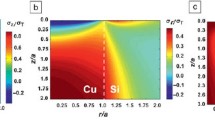Abstract
Potential challenges with managing mechanical stress distributions and the consequent effects on device performance for advanced 3D integrated circuit (IC) technologies are outlined. A set of physics-based compact models for a multi-scale simulation, to assess the mechanical stress across the device layers in silicon chips stacked and packaged with the 3D through-silicon-via (TSV) technology, is proposed. A calibration technique based on fitting to measured stress components and electrical characteristics of the test-chip devices is presented. For model validation, high-resolution strain measurements in Si channels of the test-chip devices are needed. At the nanoscale, the transmission electron microscopy (TEM) is the only technique available for sub-10 nm strain measurements so far.











Similar content being viewed by others
References
Borkar S (2009) 3D Integration for energy efficient system design. Proc IEEE Symp VLSI Technol 978-4-86348-009-4:58–59
COMSOL Multiphysics, http://www.comsol.com
Engelmann HJ, Geisler H, Huebner R et al (2008) Challenges to TEM in high-performance microprocessor manufacturing. Proc 4th EMC 2:13–14
Jones RM (1975) Mechanics of composite materials. Hemisphere Publishing Corporation, New York
Joshi V, Sukharev V, Torres A et al (2010) Closed-form modeling of layout-dependent mechanical stress. Proc DAC ACM 978-1-4503-0002-5:673–678
Koch CT, Özdöl VB, van Aken PA (2010) An efficient, simple, and precise way to map strain with nanometer resolution in semiconductor devices. Appl Phys Lett 96:091901
Love AEN (1929) The stress produced in a semi-infinite solid by pressure on part of the boundary. Philos Trans A 228:377–420
Mercado L, Kuo SM, Goldberg C, Frear D (2003) Impact of flip-chip packaging on copper/low-k structures. IEEE Trans Adv Packag 26:433–440
Polyanin AD (2002) Handbook of linear partial differential equations for engineers and scientists. Chapman & Hall/CRC Press, Boca Raton
Ryu SK, Lu KH, Zhang X, Im JH, Ho PS, Huang R (2011) Impact of near-surface thermal stresses on interfacial reliability of through-silicon-vias for 3-D interconnects. IEEE Trans Device Mater Reliab 11:35–43
Sukharev V, Kteyan A, Khachatryan N et al (2010) 3D IC TSV-based technology: stress assessment for chip performance. AIP Conf Proc 1300:202–213
Thompson SE, Armstrong M, Auth C et al (2004) A 90-nm logic technology featuring strained-silicon. IEEE Trans Electron Devices 51:1790–1797
Timoshenko S, Goodier JN (1952) Theory of elasticity. McGraw-Hill, New York
Author information
Authors and Affiliations
Corresponding author
Additional information
Responsible Editor: E. J. Marinissen
Rights and permissions
About this article
Cite this article
Sukharev, V., Kteyan, A., Choy, JH. et al. Multi-scale Simulation Methodology for Stress Assessment in 3D IC: Effect of Die Stacking on Device Performance. J Electron Test 28, 63–72 (2012). https://doi.org/10.1007/s10836-011-5259-y
Received:
Accepted:
Published:
Issue Date:
DOI: https://doi.org/10.1007/s10836-011-5259-y




